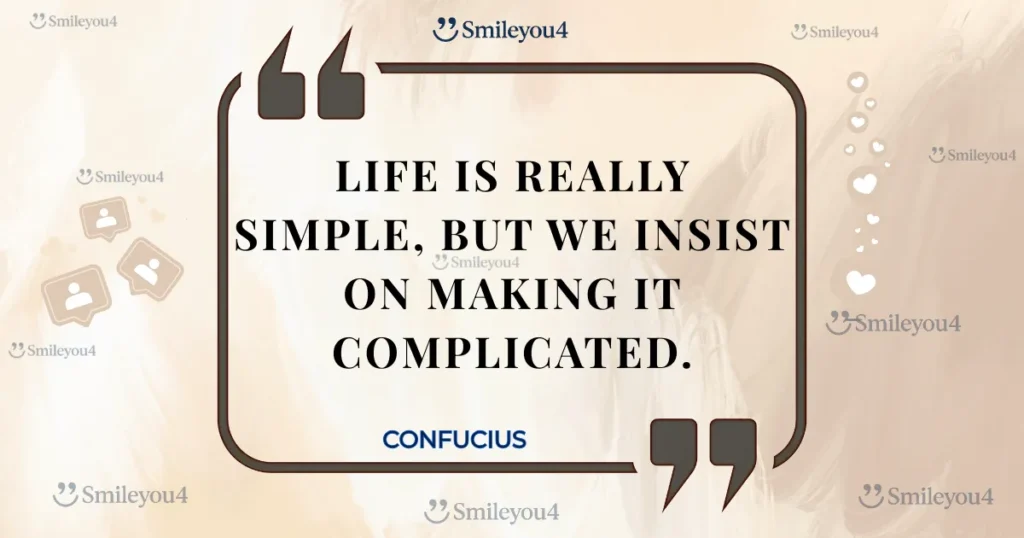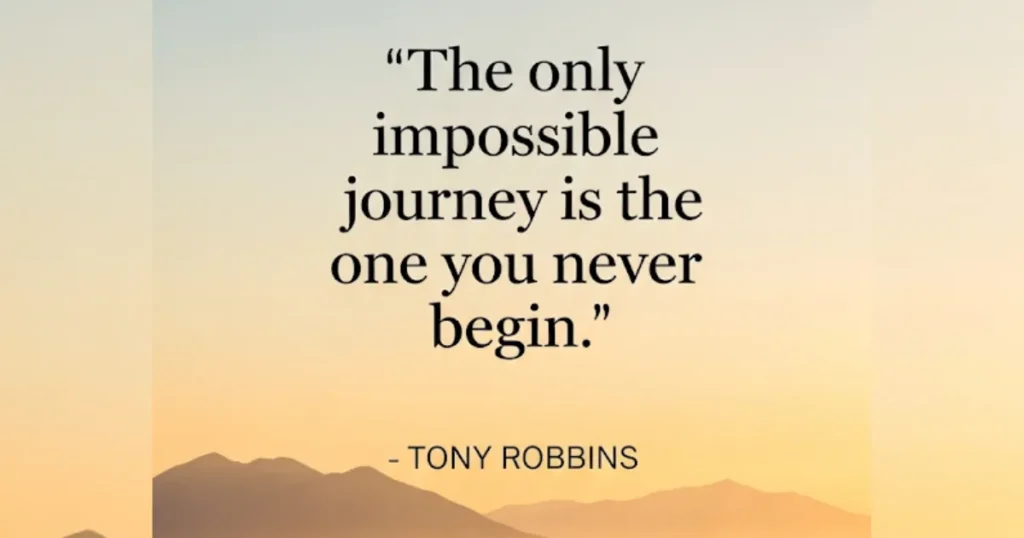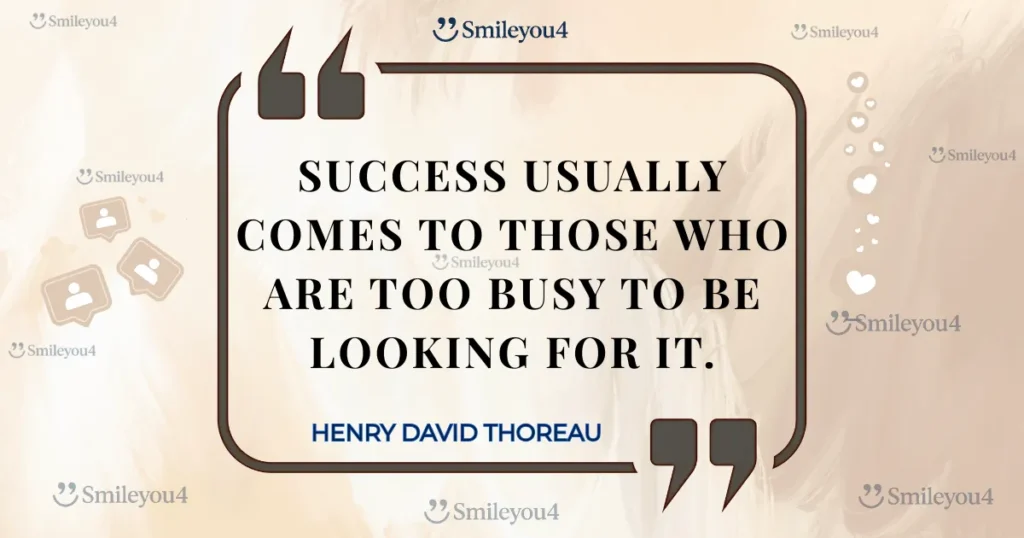Have you ever felt like you’re drowning in endless to-do lists, overwhelming choices, and constant pressure to do more, be more, achieve more? What if one of history’s greatest philosophers already discovered the antidote to this modern madness over 2,500 years ago? Confucius understood something profound when he said, “Life is really simple, but we insist on making it complicated.” This Confucius quote isn’t just ancient wisdom—it’s your roadmap to peace in our chaotic world.

Think about your happiest moments. Were they during complicated achievements or simple pleasures? Maybe it was laughing with friends, watching a sunset, or sharing a quiet meal with someone you love. These experiences prove what Confucius knew: life is really simple at its core, and our happiness comes from embracing this simplicity rather than fighting it.
Today, you’ll discover why this timeless wisdom holds the key to reducing stress, increasing joy, and finding clarity in a world that profits from your confusion. Let’s explore how the Confucius quote life is really simple can transform your daily experience starting right now.
Understanding Confucius’ Revolutionary Approach to Simplicity
The Sage Who Found Truth in Everyday Wisdom
When Confucius declared that life is really simple, he spoke from decades of observing human nature and social dynamics. As one of China’s most influential philosophers, he watched people create unnecessary suffering through overcomplication, competition, and the endless pursuit of external validation.
Confucius lived during a time of political chaos and social upheaval, yet he discovered that peace and happiness weren’t found in controlling external circumstances—they emerged from simplifying your approach to life itself. His teachings consistently returned to fundamental principles: treat others with kindness, live with integrity, and focus on what truly matters.
This Confucius quote teaches us that complexity is often a choice, not a requirement. When you step back and examine your daily struggles, you’ll often find that simple solutions exist—we just overlook them because we’ve been conditioned to believe that difficult problems require complicated answers.
Why We Choose Complexity Over Simplicity
“Life is really simple, but we insist on making it complicated.” Let’s examine why we resist the very simplicity that would set us free:
Cultural conditioning tells us complexity equals importance:
- We believe busy equals productive
- More choices seem better than fewer options
- Complex solutions appear more sophisticated than simple ones
Fear drives us toward overcomplication:
- Simple solutions feel “too easy” to be effective
- We worry others will judge us for taking straightforward approaches
- Complexity gives us excuses when things don’t work out
Modern society profits from our confusion:
- Marketing creates artificial needs and endless options
- Technology promises to simplify life while adding more layers
- Expert culture suggests you need complicated systems to succeed
Understanding these forces helps you recognize when you’re making life really simple more difficult than it needs to be.
The Science Behind Simple Living and Mental Health
How Your Brain Responds to Simplicity
Modern neuroscience confirms what Confucius intuitively understood about simple living. Research shows that when you reduce decision fatigue and focus on essential priorities, your brain operates more efficiently and peacefully.
Mental benefits of embracing simplicity:
- Reduced cortisol levels from decreased decision-making stress
- Improved focus and concentration when you eliminate non-essential choices
- Enhanced creativity as your mind has space to wander and innovate
- Better sleep quality when you’re not overwhelmed by complex schedules
Physical advantages:
- Lower blood pressure from reduced chronic stress
- Stronger immune system function when you’re not constantly overwhelmed
- Increased energy levels when you stop wasting mental resources on complications
- Better digestion and overall health from a more peaceful nervous system
This scientific backing proves that the Confucius quote life is really simple philosophy isn’t just feel-good advice—it’s a practical strategy for optimal well-being.
The Paradox of Choice and Decision Fatigue
Psychologist Barry Schwartz’s research on “The Paradox of Choice” validates Confucius’ insight perfectly. Studies show that while some choice is essential for well-being, too many options create anxiety, regret, and paralysis. When you embrace that life is really simple, you free yourself from the exhausting burden of endless decision-making.
People who simplify their choices experience:
- 23% less anxiety about making the “wrong” decision
- Increased satisfaction with their choices once made
- More time and energy for activities that truly matter
- Greater confidence in their decision-making abilities
Real-Life Champions of Simple Living
Warren Buffett: Billion-Dollar Simplicity
Warren Buffett, one of the world’s most successful investors, embodies the life is really simple Confucius quote philosophy in his approach to both business and life. Despite managing billions of dollars, Buffett maintains remarkably simple principles and daily routines.
His approach to simplicity includes:
- Living in the same modest home he bought in 1958
- Following simple investment rules: buy what you understand, hold for the long term
- Maintaining consistent daily routines that eliminate unnecessary decisions
- Focusing on a few key relationships rather than networking constantly
Buffett proves that when you understand Confucius wisdom about simplicity, you can achieve extraordinary results without extraordinary complexity.
Marie Kondo: Joy Through Simplification
Marie Kondo’s global success with “The Life-Changing Magic of Tidying Up” demonstrates how millions of people hunger for the simplicity that Confucius taught. Her method isn’t really about organizing—it’s about applying the principle that life is really simple when you focus on what truly brings joy.
Her approach shows:
- Keeping only items that “spark joy” eliminates decision fatigue about possessions
- Simple categories (clothes, books, papers, komono, sentimental) make organizing manageable
- One question—”Does this spark joy?”—replaces hundreds of smaller decisions
- Physical simplicity creates mental clarity and emotional peace
Kondo’s success proves that people intuitively understand the Confucius quote truth—they just need permission to embrace it.
Steve Jobs: Elegant Simplicity as Innovation
Steve Jobs revolutionized technology by applying Confucius principles to product design. His famous obsession with simplicity wasn’t about minimalism for its own sake—it was about understanding that life is really simple when you eliminate everything non-essential.
Jobs’ simplicity philosophy included:
- Removing buttons, features, and options that didn’t serve the core purpose
- Creating products so intuitive that instruction manuals became unnecessary
- Focusing on a few products done exceptionally well rather than many done adequately
- Believing that true sophistication comes from simplicity, not complexity
His legacy proves that embracing the life is really simple principle doesn’t limit innovation—it unleashes it.
Practical Steps to Simplify Your Life Today
Start Your Morning with Simple Intentions
Transform your mornings by applying Confucius wisdom about simplicity from the moment you wake up:
Simple morning rituals:
- Choose three priorities for your day instead of creating endless to-do lists
- Wear similar clothes to eliminate decision fatigue (think Steve Jobs’ black turtlenecks)
- Practice gratitude for simple pleasures: coffee, sunlight, the gift of a new day
- Set one clear intention for how you want to feel, not just what you want to accomplish
Eliminate morning complexity:
- Prepare everything possible the night before
- Create routines that run on autopilot rather than requiring constant decisions
- Focus on one thing at a time instead of multitasking
- Remember that life is really simple when you don’t overcomplicate your start
Apply the 80/20 Rule to Your Priorities
The Pareto Principle validates Confucius quote wisdom perfectly: 80% of your results come from 20% of your efforts. When you embrace that life is really simple, you start focusing on the vital few rather than the trivial many.
In your career:
- Identify the 20% of activities that create 80% of your value
- Eliminate or delegate tasks that don’t contribute to your core mission
- Focus deeply on a few key skills rather than trying to be good at everything
- Choose quality relationships over networking with everyone
In your relationships:
- Invest deeply in a few meaningful connections rather than maintaining hundreds of superficial ones
- Practice simple acts of kindness instead of grand gestures
- Listen fully instead of planning what to say next
- Choose presence over presents in showing you care
In your personal growth:
- Focus on one or two habits at a time rather than trying to change everything
- Choose books and courses that align with your core interests
- Practice simple daily disciplines rather than complicated improvement systems
- Remember that small, consistent actions create bigger changes than dramatic overhauls
Create Your Personal Simplicity System
Develop specific strategies that help you live the life is really simple Confucius quote wisdom consistently:
Daily simplicity practices:
- Use the “One Touch Rule”: handle emails, documents, and tasks once instead of revisiting them multiple times
- Ask “Is this essential?” before adding anything to your schedule or buying anything new
- Practice saying “no” to good opportunities so you can say “yes” to great ones
- End each day by choosing tomorrow’s top three priorities
Weekly simplicity reviews:
- Assess what complicated your life this week and look for simpler alternatives
- Identify activities that drained energy without providing proportional value
- Celebrate moments when you chose simple solutions over complex ones
- Plan upcoming weeks with margin for unexpected opportunities or challenges
Overcoming Common Obstacles to Simple Living
Moving Beyond “Simple Equals Lazy” Thinking
Many people resist embracing that life is really simple because they equate simplicity with laziness or lack of ambition. This misconception prevents them from experiencing the power of focused effort.
Reframe simplicity correctly:
- Simple doesn’t mean easy—it means essential
- Focusing on fewer things allows you to excel rather than just survive
- Elimination creates space for what matters most
- Confucius taught that wisdom comes from knowing what to ignore, not just what to pursue
Build confidence in simple approaches:
- Study successful people who embrace simplicity principles
- Experiment with simple solutions before defaulting to complex ones
- Track results from simple versus complicated approaches
- Remember that nature operates on simple principles that create infinite complexity
Dealing with Social Pressure to Complicate
When you choose to live by Confucius quote principles, you might face pressure from others who equate busy with important or complex


